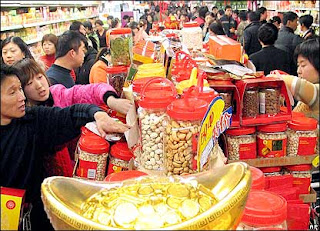I enjoy writing about the things I observe in China. But for this post I thought I would share something that I read. Written by a Professor Lin, these lines very clearly sum up the feelings of many here in China. When you read it, try to imagine that you are Chinese:
When we were the sick man of Asia, we were called the yellow peril.
When we are billed to be the next superpower, we are called the threat.
When we closed our doors, you smuggled drugs to open markets.
When we embrace free trade, you blame us for taking away your jobs.
When we were falling apart, you marched in your troops and wanted your fair share.
When we tried to put the broken pieces back together again,
free Tibet you screamed, It was an invasion!
When tried communism, you hated us for being communist.
When we embrace capitalism, you hate us for being capitalist.
When we have a billion people, you said we were destroying the planet.
When we tried limiting our numbers, you said we abused human rights.
When we were poor, you thought we were dogs.
When we loan you cash, you blame us for your national debts.
When we build our industries, you call us polluters.
When we sell you goods, you blame us for global warming.
When we buy oil, you call it exploitation and genocide.
When you go to war for oil, you call it liberation.
When we were lost in chaos and rampage, you demanded rules of law.
When we uphold law and order against violence, you call it violating human rights.
When we were silent, you said you wanted us to have free speech.
When we are silent no more, you say we are brainwashed-xenophobes.
“Why do you hate us so much﹖”we asked.
“No,” you answered, “we don"t hate you.”
We don"t hate you either, but, do you understand us?
“Of course we do, ”you said, “We have AFP, CNN and BBC"s ……”
What do you really want from us?
Think hard first, then answer, Because you only get so many chances.
Enough is enough, enough hypocrisy for this one world.
We want one world, one dream, and peace on earth.
This big blue earth is big enough for all of us.






























